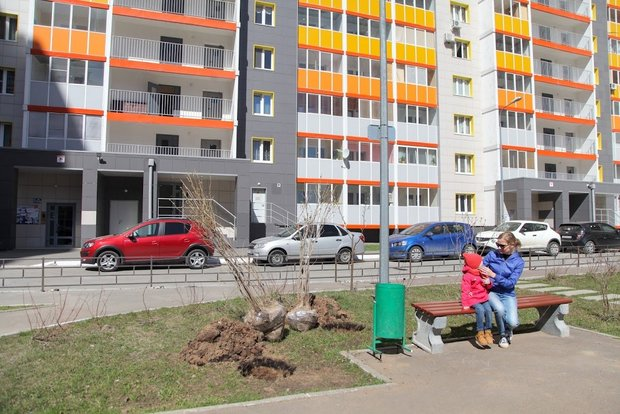Rinat Sadykov: ‘The youth fear credit dependence, but their purchasing power doesn’t grow”
The first vice minister of youth affairs of Tatarstan asked deputies to help to reduce the social mortgage rate for young families
Youth outflow from Tatarstan to Russian big cities grows reaching the rich-oil southeast of the republic. “Bugulma, Almetyevsk, Leninogorsk. 60% of youth left the region last year,” said First Vice Minister of Youth Affairs of Tatarstan Rinat Sadykov at a meeting of the parliamentary Committee for Social Policy. Delivering a speech in the Tatarstan State Council with a report on the youth state policy strategy through 2030, he almost gave the audience to understand that the youth went not for fun. 400,000 in a million young people are officially employed, few families receive benefits when buying a home, while salaries in the republic are low. Deputies offer to keep the migration by introducing social rent. Read more in Realnoe Vremya’s report.
Three years after the division into youth and sport
Holding migration of young people of working age from Tatarstan to other regions remains a priority task in the Youth State Policy Strategy through 2030, said First Vice Minister of Youth Affairs of Tatarstan Rinat Sadykov at the meeting of the Tatarstan State Council’s Committee for Social Policy.
The management of the Ministry of Youth Affairs reported on the strategy adopted three years ago to parliamentarians. In fact, the document became the foundation for the activity of the new ministry created after the division from the Tatarstan Ministry of Sport. Then Damir Fattakhov who as a consequence grew into vice chairman of the Federal Agency for Youth Affairs chaired the Ministry of Youth Affairs.
Everybody whose job is somehow related to the youth gathered at the meeting. Ombudsman for Human Rights in Tatarstan Saria Saburskaya, Vice Minister of Labour, Employment and Social Protection of Tatarstan Natalia Butayeva were among them. Vice Director General of Social Policy at Tatneft Nail Mukhamadeyev joined via teleconference.
Perhaps, the report was some rehearsal before the final meeting, which was going to be on 31 January, probably with the Tatarstan president. The problem of youth outflow from regions already started to have a negative impact on the prospect of economic growth and economic diversification.
7 key tasks of Tatarstan youth strategy
Giving a speech to the deputies, Rinat Sadykov voiced seven key tasks of the Youth Policy Strategy. As his presentation read, it is the creation of conditions for multi-faceted fulfilment of the youth, introduction of innovative educational technologies as well as the creation of a system of healthy lifestyle values.
However, these narratives are poorly connected with real requests of the youth when it comes to the creation of life and career. As the report read, nowadays the Youth State Policy Strategy through 2030 includes seven sectoral sub-programmes aimed primarily at the youth’s leisure time.
The Organisation of Children and Youth’s Holiday in 2019-2025 is still the most expensive one that envisages major overhaul of kindergartens. According to Rinat Sadykov, a billion rubles were allocated for these goals last year.
The Development of Social and Engineering Infrastructure within the state programme Development of Youth Policy in the Republic of Tatarstan in 2019-2025 was second most expensive subprogramme. 750 million rubles were given to repair driveways to camps in the last three years.

Also, 363 million rubles have been allocated this year to create youth centres in municipalities. Other programmes are designed to develop the patriotic and volunteer movement. The transformation of mental help centres — which are 15 — is given a special place in the strategy. As Sadykov noted, they must change the ideology and become more friendly and open towards teenagers and at the same time save the privacy of appointments.
No job, no home or why the youth go
Then he switched to key challenges the youth face. He singled out three expected problems: employment, housing problem, leisure time. According to him, nowadays about 400,000 people work in large enterprises and services. However, university graduates’ salary expectations don’t live up to the vacancies that are offered.
170,000 young people live in the countryside. As Sadykov noted later, if they were offered a good job with a salary of 35-40,000 rubles, they wouldn’t rush to leave the homeland. Other youngsters work illegally.
The housing issue caused heated debates. Sadykov said that four mechanisms of subsidisation to buy a home for young people worked in the republic. In fact, none of them became widespread. Firstly, a youth programme where 17,5 million rubles of federal subsidies and 50 million rubles of republican money continues operating. Last year, 50 families managed to buy a home, they received from 600,000 to 2 million rubles of subsidies.

“We asked the State Housing Fund to lower the rate to 5% a year”
According to him, the social mortgage programme for the youth didn’t meet the expectations. In 1,5 years, 738 families managed to improve their living conditions, while 1,500 families applied for it. Sadykov claimed that the terms of the programme remain tough to meet.
“We offered to lower the instalment from 10% to 5% and the interest rate from 7% to 5%,” he said and added that he continued holding talks with the State Housing Fund. “The youth fears loan dependence, doesn’t want to spoil their credit story, but their purchasing power doesn’t grow.”
Then Vice Director General of Social Policy at Tatneft Nail Mukhamadeyev offered to provide a social rent unless “they have both feet on the ground.” In conclusion, the deputies claimed that the problem of youth employment, first of all, young specialists, remained topical. They also noted the insufficient efficacy of mechanisms of including the youth to public life in cities and districts of the republic, especially in the countryside, towns. The youth migration from the countryside goes on. While the share of the youth in difficult circumstances that met negatives tendencies of alcoholisation, crime, in contrast, increase.

At the end of the speech, the first vice youth minister of the republic told journalists that the problem of youth migration was intergovernmental the Ministry of Youth Affairs worked together with the Tatarstan Ministry of Economy. According to him, growth points are determined during the creation of agglomerations where workforce will be needed. “This is why we cannot say they should stay here and go there,” Sadykov added.